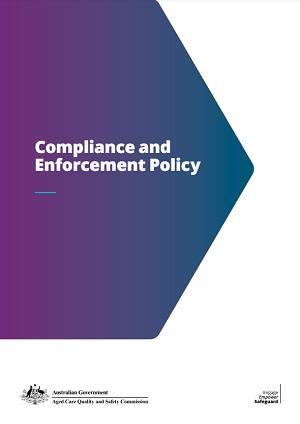This flyer is part of the Commission’s resource bundle to improve antibiotic use for urinary tract infections in aged care services.

This audit tool is part of the Commission’s resource bundle to improve antibiotic use for urinary tract infections in aged care services.

This provider poster is an educational tool is part of the Commission’s resource bundle to improve antibiotic use for urinary tract infections in aged care services.

This provider poster is an educational tool is part of the Commission’s resource bundle to improve antibiotic use for urinary tract infections in aged care services.

RB 2021-14 This Regulatory Bulletin outlines the Commission’s regulatory approach where there is a transfer in ownership of a residential aged care service from one approved provider to another.

Our Compliance and Enforcement Policy has been updated to align with our Regulatory Strategy , the Supervision Model, and our renewed approach to compliance and enforcement with the current aged care legislation.

In this short video, we provide an overview of the benefits of effective incident management in residential aged care settings under the Serious Incident Response Scheme (SIRS), which commenced on 1 April 2021.

In this short video, we discuss incident management in residential aged care settings under the Serious Incident Response Scheme (SIRS) which commenced on 1 April 2021.

This fact sheet provides information about the revised incident management obligations within Standard 8 for home services providing aged care.

This booklet aims to give guidance on how to:
- create an effective, resolution focused complaints system in aged care services and how to enhance existing processes
- maintain compliance with Standard 6
- encourage a positive, blame-free culture around complaints handling in aged care services by fostering an understanding of the complaints process and how it affects the people involved, and setting out the essential elements for the effective management of complaints within a service including skills, procedures and policies.

The Serious Incident Response Scheme (SIRS) is a new initiative to help prevent and reduce the risk of incidents of abuse and neglect in residential aged care services subsidised by the Australian Government. The SIRS requires residential services to have an effective incident management system or IMS.
An IMS is key to a provider’s ability to effectively identify, respond to, and mitigate the impact of an incident, and enables providers to analyse and identify risks and trends to inform preventative measures.
This fact sheet describes how incidents should be recorded in your IMS to meet your obligations under SIRS and provide safe care to your residents.

This poster outlines the 6 essential elements of effective incident management systems.
This resource is not available to order.

The Serious Incident Response Scheme (SIRS) launched on 1 April 2021. The Aged Care Quality and Safety Commission is helping the aged care sector to prepare for the introduction of the scheme with information and resources and is hosting a series of webinars about the scheme. This second webinar discussed the importance of an effective Incident Management System under the SIRS.

This guidance provides information for providers to help them to develop and embed a best practice incident management system which enables them to respond to and manage specific incidents and near misses by assessing:

The Serious Incident Response Scheme (SIRS) launched on 1 April 2021. The Aged Care Quality and Safety Commission is helping the aged care sector to prepare for the introduction of the scheme with information and resources and is hosting a series of webinars about the scheme. This first webinar provides an introduction to SIRS and the importance of incident management systems.

This fact sheet provides guidance to providers of aged care on an effective incident management system, the Serious Incident Response Scheme (SIRS). The Serious Incident Response Scheme (SIRS) is a new initiative to help prevent and reduce the risk of incidents of abuse and neglect in residential aged care services subsidised by the Australian Government.

On Thursday 10 December 2020, the Aged Care Quality and Safety Commissioner Janet Anderson hosted a webinar on the recently released new outbreak management planning in aged care guide for aged care providers.

This short video explains how to assist residential aged care providers to support their workers, care recipients, families and visitors to prevent, prepare for and manage outbreaks of COVID-19.

The Commissioner wrote to approved providers on 7 December 2020 about visitor access in a COVID-normal world

In the event of an outbreak of COVID-19 at a residential service, the service’s Outbreak Management Team and key personnel at the service will be working in close co-operation with public health authorities and other parties to ensure an effective emergency response. A key personnel template has been developed to assist providers in identifying key personnel of the service and their contact details to support this response.









